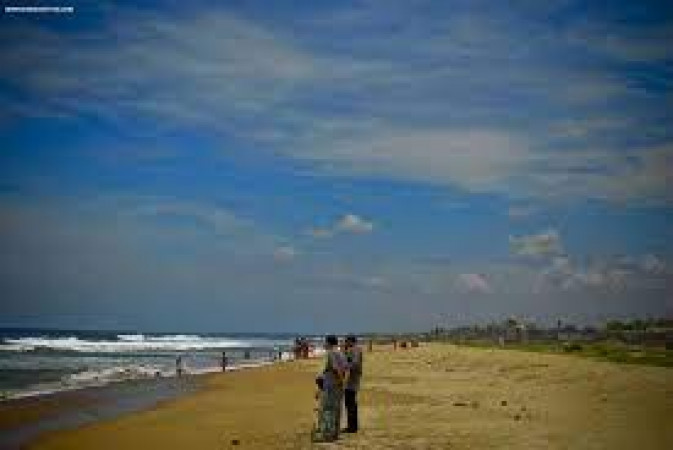
Akkarai Beach
Chennai . Tamil Nadu . India
Duration
1 to 3 Days
1 to 3 Days
Best time to visit
Nov-Mar
Nov-Mar
Theme
Beaches
Beaches
Akkarai Beach Travel Guide
Akkarai Beach is a stunning coastal destination located in the southern part of India. This picturesque beach is known for its golden sands, clear blue waters, and serene atmosphere. It offers a perfect escape for travelers looking to unwind and enjoy the beauty of nature.Top Attractions in Akkarai Beach
- Relaxing on the pristine beaches
- Exploring the nearby fishing villages
- Water sports activities like jet skiing and parasailing
- Visiting the ancient Mahabalipuram temple complex
Akkarai Beach is Famous for
Breathtaking sunsets and water sports activities.Top Attractions in Akkarai Beach
- Relaxing on the pristine beaches
- Exploring the nearby fishing villages
- Water sports activities like jet skiing and parasailing
- Visiting the ancient Mahabalipuram temple complex
What's Great about Travelling to Akkarai Beach?
- Perfect for beach lovers and water sports enthusiasts
- Serene and peaceful environment for relaxation
What's Not So Great about Travelling to Akkarai Beach?
- Limited nightlife and shopping options
- Can get crowded during peak tourist seasons
Travel Tips for Akkarai Beach
- Carry sunscreen and hats to protect from the sun
- Respect the local culture and customs
- Book accommodations in advance during peak seasons
Important Akkarai Beach trip information
- Ideal Duration: A weekend getaway
- Best Time to Visit: November to February
- Nearby Airports and Railway Stations: Chennai International Airport and Chengalpattu Railway Station
FAQ's on Akkarai Beach
Q1: What is the best time to visit Akkarai Beach?
The best time to visit Akkarai Beach is during the winter months from November to February when the weather is pleasant with clear skies and cool breezes. This time is perfect for beach activities, water sports, and enjoying the scenic beauty of the coastline. Avoid the monsoon season from June to September due to heavy rainfall and rough seas.
Q2: Do I need a visa to travel to Akkarai Beach?
Tourists visiting Akkarai Beach do not require a specific visa for the beach itself. However, if you are traveling to India, you will need a valid Indian visa. Ensure you check the visa requirements based on your nationality and the duration of your stay.
Q3: What are the must-visit attractions in Akkarai Beach?
The must-visit attractions in Akkarai Beach include the pristine sandy shores, water sports like jet skiing and parasailing, exploring the nearby fishing villages, and enjoying fresh seafood at local eateries. Don't miss the stunning sunrise and sunset views over the Bay of Bengal.
Q4: Is Akkarai Beach a safe place to travel?
Akkarai Beach is generally a safe destination for travelers. However, it's advisable to take precautions like not wandering alone at night, safeguarding your belongings, and following local safety guidelines. Avoid secluded areas and be mindful of the sea conditions when swimming.
Q5: What is the local currency in Akkarai Beach and can I use credit cards?
The local currency in Akkarai Beach is the Indian Rupee (INR). While credit cards are accepted at some hotels and larger establishments, it's advisable to carry cash for smaller vendors and local markets. ATMs are available in nearby towns for convenient access to cash.
Q6: What is the local cuisine like in Akkarai Beach?
Akkarai Beach offers a delightful culinary experience with fresh seafood dishes like fish fry, prawn curry, and crab masala. You can also savor traditional South Indian delicacies like dosas, idlis, and spicy chutneys. Vegetarian options are widely available, and don't miss trying the local specialty, 'Chettinad cuisine.'
Q7: What transportation options are available in Akkarai Beach?
Transportation options in Akkarai Beach include taxis, auto-rickshaws, and private car rentals for local travel. Public buses are also available to nearby towns. For longer journeys, you can book intercity buses or hire a cab. Exploring the beach on foot or renting a bicycle are great ways to enjoy the scenic beauty at a leisurely pace.
Q8: Are there any cultural norms or etiquette I should be aware of when visiting Akkarai Beach?
When visiting Akkarai Beach, it's important to respect local customs and traditions. Dress modestly, especially when visiting religious sites. Remove footwear before entering temples or homes. It's customary to greet locals with a 'Namaste' and show courtesy in interactions. Avoid public displays of affection and be mindful of local sensitivities. Embrace the warm hospitality of the locals and immerse yourself in the rich culture of the region.
Q9: I am a travel agent. How can I buy travel leads of Akkarai Beach?
Register yourself as a travel agent at agents.tripclap.com and then you can buy travel leads to Akkarai Beach once your account is approved. For more details contact our support team at +91-8069186564 or support@tripclap.com
